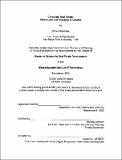Corporate real estate : challenges and practices in Ukraine
Author(s)
Smetana, Victor (Victor Stephan), 1966-
DownloadFull printable version (4.661Mb)
Other Contributors
Massachusetts Institute of Technology. Dept. of Urban Studies and Planning.
Advisor
Sandra Lambert.
Terms of use
Metadata
Show full item recordAbstract
Real property has been called the corporation's last undermanaged resource. However, during the past decade, companies have begun to concentrate more on what constitutes 25 to 40% of a typical corporation's assets. US corporate real estate assets amount to greater than $3 trillion and real estate expenses are typically second or third highest on the corporate ledger, only behind payroll and sometimes technology. Corporate executives have begun to realize the business value real estate can have. Facilities lacking the proper location, finance, design, or the proper amount of flexibility required to manage internal and external uncertainties can negatively impact the corporation's bottom line. Meanwhile, strategic planning increases in importance in the international setting due to the risks and rewards of executing business strategies increases at the international level. The collapse of communism in Central and Eastern Europe has opened twenty-eight countries to free markets. Corporations are hungry to expand into these markets which offer the opportunity of serving over 400 million customers. Uncertainties are heightened in transitional economies, making international corporate real estate management that much more challenging. This thesis research was a qualitative exploration of the corporate real estate challenges and practices in one particular transitional economy, Ukraine. Corporate real estate in Ukraine was found to be transactional in nature, not strategic. Almost all decisions are made locally. The challenges found in Ukraine center around an immature administrative infrastructure along with corporate efforts to control the costs associated with real estate. Although complex, the challenges found in Ukraine do not preclude participation in the market; rather, they merely impede the process.
Description
Thesis (S.M.)--Massachusetts Institute of Technology, Dept. of Urban Studies and Planning, 2000. Includes bibliographical references (leaves 70-72).
Date issued
2000Department
Massachusetts Institute of Technology. Department of Urban Studies and PlanningPublisher
Massachusetts Institute of Technology
Keywords
Urban Studies and Planning.